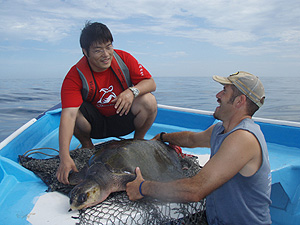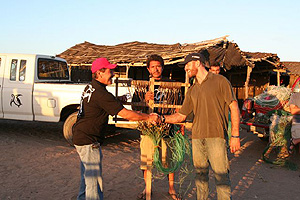After meeting with Hawaiian and Japanese fishermen in August, a leading Mexican shark fisherman declared that he would immediately stop using the longlines that kill hundreds of endangered loggerhead turtles each year. His declaration resulted from a unique international program that has brought together fishermen from across the Pacific Ocean to brainstorm solutions that will enable them to conserve sea turtles while maintaining livelihoods and traditional fishing practices.
UCSC graduate student Hoyt Peckham, through his work with the conservation group Pro Peninsula, organized an international delegation of fishermen, scientists, and community leaders that has traveled to fishing communities in Mexico, Japan, and Hawaii. The delegation has been traveling along the vast migratory route of the loggerhead turtle, meeting with fishing communities to raise awareness of sea turtle conservation and to share experiences and ideas.
"By talking about what they have learned, fishermen are enabling and inspiring their peers to develop workable, effective solutions," said Peckham, whose thesis research for a Ph.D. in ecology and evolutionary biology focuses on loggerhead turtles of the North Pacific Ocean.
Born on the beaches of southern Japan, North Pacific loggerhead turtles migrate across the Pacific via the Hawaiian Islands. Despite efforts by sea turtle conservation experts in the United States, Mexico, and Japan, the number of nesting females has declined by 50 to 80 percent over the past decade. Loggerheads are under threat from pollution, beach erosion, development, and habitat loss. In addition, incidental bycatch from fisheries is a major threat to their survival.
Loggerhead turtles are very long-lived, taking at least 30 years to reach reproductive maturity. As a result, there are far more juveniles in the population than adults. In Baja California, the juveniles feed and mature until they reach reproductive age, then return to Japan to mate and nest. Although dangerously few loggerheads are left, they appear to be numerous to Mexican fishermen, because the turtles spend decades maturing in the rich waters off Mexico's Baja California peninsula.
In the course of his thesis research, Peckham discovered that small-scale fisheries can have catastrophic effects on the turtle population. With funding from the UC Institute for Mexico and the United States (UC MEXUS), he partnered with local fishermen in Baja California to study loggerhead habitat use and bycatch problems. He incorporated conservation goals into his research project, working with fishermen to reduce bycatch and study it at the same time.
Seed funding from UC's Pacific Rim Research Program enabled Peckham to bring a leading Japanese loggerhead turtle specialist to Mexico to share with Mexican fishermen the impact of their bycatch on the nesting turtle population in Japan. The success of that visit led to the fishermen's exchange program that brought together representatives of fishing communities from Mexico, Hawaii, and Japan, with support from the Japan Foundation and the World Wildlife Fund.
According to Peckham, fishing communities can play a crucial role in protecting loggerhead turtles. "The fishermen discuss the full costs of bycatch, such as time and resources lost to disentangling turtles and repairing damaged nets. We find that once fishermen appreciate the Pacific-wide impact and true costs of their local actions, they usually strive to reduce and eliminate their bycatch," he said.
The exchange program Peckham helped organize includes Hawaiian fishermen who have successfully reduced their bycatch through gear modifications. According to Juan Ignacio Romero, a fisherman from San Juanico, Baja California Sur, Hawaiian fishermen are setting an example for others.
"The world needs to hear about their achievements and the fact that they are still making a living from fishing," Romero said.
As a result of his participation in the exchange, Efrain de la Paz, the patron of a Mexican shark fishing fleet, declared that he would no longer use the deadly bottom-set longlines that are such a menace to loggerheads. His announcement represents a monumental breakthrough in loggerhead conservation, as each of his fleet's six skiffs was killing more loggerheads per day than any other fishery or fleet on record, according to Peckham.
"Prior to this program, we didn't realize the global impact of our local bycatch. Once we understood, we saw that our bycatch was an embarrassment and grave problem," de la Paz said. He is now working with fishermen from Hawaii and Japan to adopt other fishing techniques that will enable him to maintain his catch levels.
Peckham organized the exchange program through Pro Peninsula, a nonprofit organization that offers support to conservation groups on the Baja California peninsula. One of the program's cofounders is Wallace J. Nichols, scientific adviser to Pro Peninsula and senior scientist with Ocean Conservancy. "Science alone isn't enough to save sea turtles and other species," Nichols said. "Hope lies with local communities working together internationally and sharing real-world ideas."
Nichols and Peckham have found that the conservation message is more credible coming from peers than from conservationists. "The real solutions will come from local fishermen," Peckham said.
For more information about the exchange program, visit the Pro Peninsula web site or contact Hoyt Peckham at hoyt@propeninsula.org.




